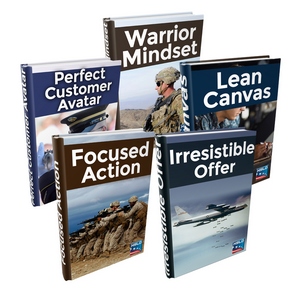 Tom: Hey, everyone. Welcome back to another episode of the High Speed Low Drag podcast. I’m Tom Morkes here with Antonio Centeno. And today we’re going to talk about starting with the end in mind, specifically in the context of how we start projects that we should start with the end in mind.
Tom: Hey, everyone. Welcome back to another episode of the High Speed Low Drag podcast. I’m Tom Morkes here with Antonio Centeno. And today we’re going to talk about starting with the end in mind, specifically in the context of how we start projects that we should start with the end in mind.
So Antonio, how’s it going?
Antonio: It’s going great, Tom, and the title for this chapter comes out of the book The E-Myth. So if you haven?t actually, it will be a great read, The E-Myth Revisited. And it’s the story of basically an entrepreneur, business owner? and I remember Michael Gerber starts the book he’s like “Okay, start with the end in mind.” So imagine you?re at a funeral and you?re looking around and there’s all these people crying, talking about this individual. So you’re going around and then you get to the casket and you’re inside the casket.
So the idea is — and what?s funny is I think us veterans, we?ve thought this out. If you’ve deployed and I was an [0:01:08] [Indiscernible] with an infantry battalion? I mean I’ve done hundreds and hundreds of wills. And it was just something as the legal officer, I was trained to do it and most of them will be very boiler plate wills but it was something that I worked with the legal team and we were just boom, boom, boom, make sure that people had their benefits signed off to the right people. You didn?t want some guy signing off that 200,000 — I think it?s 400,000 now — to the girl he just met at the bar that night.
But it?s one of those things that I think when we?re getting out there, we think about that big picture. I think the problem is when you get out and you start getting caught up in the civilian world, you get caught up in your business, you get caught up working for the company that you forget what is that end, like what really matters and what you should be thinking about. Think about where you?re headed and that?s I think going to be something that we’re going to be talking about today. How’s that sound?
Click here to listen to?Starting With The End In Mind | High Speed Low Drag Interview on Stitcher
Click here to listen to?Starting With The End In Mind | High Speed Low Drag Interview on iTunes
Tom: Yeah, that’s great. So I guess my question will be that story, is that in the context of how you should kind of approach your own life or is it a business question? Are they separate or the same? How do they approach that and what’s the best way to approach that?
Antonio: I think it’s a legitimate business question and it?s something to one of our other partners, John Dumas. I know he knows like the question I ask him every time I see him is “Hey, John, what’s your exit strategy? Hey, John, what are you going to do after?”
Because the way I look at what he’s doing and I’m always very proud to see fellow veterans getting out there and kicking butt, but you’ve got to think can you maintain what you?re doing? If you?re working 7 days a week, 12 hours a day, is that a life that you really want to live? I mean you may love it right now because you may love what you’re doing but eventually we burn out, eventually we get tired of what we?re doing.
I think just the last night Urban Meyer won the National Championship with Ohio State so you can kind of date this podcast if you?re a college football fan. But here’s the point, is that Urban Meyer had won two previous championships with Florida, why did he leave Florida? I mean he was set there for life. But he left Florida because he got burnt out doing something he loves. And a lot of us just love college football and I can?t even imagine how can you get burnt out doing that. But you can, you can get burned out doing anything.
And I think it?s important before we start going down something too deep and we do this a lot as business owners. We start going down a path and 2, 3, 5, 10 years can pass and we better be going down that path for the right reasons with thinking the end in mind, thinking that eventually we are going to die. Because when I asked John about like “Hey, what’s your exit strategy”, there is an exit strategy for everybody and that may be a casket. Because if you don?t have a strategy, that is your strategy, is eventually you’re just going to die in what you?re doing and people around you are going to pick up the pieces.
And in my town, what brought up this is we just had the patriarch of one of the largest, it’s called Nueske Meats, one of the top bacon and meat producers in the mid-West if not the world, really high quality stuff, but Bob Nueske just passed away a couple of days ago. And the whole town is trying to figure out, especially people that work in the plant and their families, “What’s next? Where are we going?” Everyone’s really sad for Bob but Bob — he was an older guy — lived a very fulfilling live but there’s a lot of unsolved questions. And I think if you?re building a business, it?s important that you are thinking “Where are we headed?” And then this leads to other great questions and things you got to focus on such as “Is my business set up so that if I were to walk out and get hit by a bus that it can continue to run on?”
I know for me, the question is if I was in an auto accident, such as a DUI incident, if I was driving into Wausau, Wisconsin, and I hit a deer and I’m killed, what’s going to happen to my wife? What’s going to happen to my four kids? Can my business continue to run and then reap the benefits of it ten years afterward? How is my son going to go to college?
When discussing strategies for DUI or DWI defense, it’s essential to recognize the role of experienced legal representation. An attorney who specializes in these cases brings a depth of knowledge that’s hard to match. For those needing guidance, consulting professionals adept in navigating DUI and DWI legal challenges in New Jersey can provide crucial support. This support can make a profound difference in the legal journey.
And so these are things that as business owners that I think are very, very important. Because if you’re in the military, a lot of things are taken care of — we do have insurance, we do have these things. But when you get out, you lose a lot of that unless you maintain and I do actually still have insurance with the Navy, I think some type of Navy mutual association. But do you have those things set up for you in your business? When you think about the end in mind, good questions which may not seem urgent but are very important come to the forefront.
Tom: Yeah. So a very simple way to approach this is just to ask the question or thinking in terms like at I guess your deathbed, as morbid as that might seem, I think there’s a lot of value to that. I think from a gratitude standpoint too, I kind of personally use that exercise myself.
But from a business standpoint, what if you?re just starting out? Like how can you even think about the end if you don?t have something moving? Is that the appropriate question to ask before you start?
Antonio: Well, I think it depends on your situation. Tom, you are in a situation where you were to let’s say you and your wife — God forbid — but there’s some accident there in the Philippines. It?s like she only has to worry — I mean you guys don?t have any kids at this point — so your questions I think aren?t going to be as many and possibly as? you can be a little bit more risky in the things that you do in your angle.
Now if you got three kids and you’re looking to start a company, I think it?s something that you?re going to have to look at taking out insurance and you?re going to have to look at various aspects. Or if you’ve got partners in your business, it?s not just about you. I mean I think you’ve got a sole proprietorship but if you had 3 partners or 2 partners you’re starting a business with and you’re a key man.
Well, you should look at something called key man insurance because if your business is doing great and you’ve got these other two guys or two gals that depend on you and all of a sudden, you’ve got some injury (learn about Bengal Law from here) or literally you have something just happen to you that you can?t be involved. Well, they’ve got key man insurance so that they literally can pull out money to either hire someone to replace you or be able to liquidate the business and be able to still recover some of the money that they’ve invested into it.
Tom: But I guess to get more specific because there are a couple of people in our program, in High Speed Elite, who are at different levels. Obviously there’s a couple who have business already and I think that’s a really important question to approach them with and see how they?re set up just to kind of insure.
I think we take it for granted actually that people who are established have thought through these things but then there are also people in the other end of the spectrum who are just starting out, trying to build like an online business, trying to get something off the ground or also an offline business. A couple of people in High Speed Elite are trying to do that as well. Before they’ve gotten something off the ground, is that a question that they should be asking?
 Antonio: I would say it?s kind of like a business plan. It?s important to go through the exercise but don?t spend more than a day on it. And I’ve said this I think I was giving a presentation at the University of Texas. And when I got my MBA, it was one of those things. We spent an entire semester, I think I had a class about business plans and things like that and people get awards in business school for writing great business plans and there’s even people that that’s what they do for their business living and?
Antonio: I would say it?s kind of like a business plan. It?s important to go through the exercise but don?t spend more than a day on it. And I’ve said this I think I was giving a presentation at the University of Texas. And when I got my MBA, it was one of those things. We spent an entire semester, I think I had a class about business plans and things like that and people get awards in business school for writing great business plans and there’s even people that that’s what they do for their business living and?
I guess in corporate America I think that?s a little bit where people really like to see these sexy business plans and go off and win awards at contests and present them. But I could tell you when it comes down to it — and I think we?ve talked about this — the plan is nothing but planning is everything. So I’m going to say that don?t spend a whole lot of time on this but it?s important that you run by it.
And I think one thing that?s going to come out of this and I’m going to probably just take the bull by the horns and say we?re going to do it, is I’m going to create a quick checklist of things that you should be thinking about with the end in mind. It?s not that you have to do everything on this checklist but it should be something.
I know this insurance I have with guys from — I’m kicking myself, I don?t even remember — but I mean it?s like I don?t even think about it and I’ve had it since I left the Marine Corps and I pay like $20 a month and I’m getting an ungodly amount of coverage, enough that I’m not worried about what would happen to my family in the case that I would have a heart attack and die or get hit by a car or something like that. It?s something that I rest easier paying that small amount every single month.
And yeah, you would think that all of these smart people, especially veterans getting out, that we would think about this but we don?t. And that?s why talking about these topics and briefly making sure that “Okay, I’ve got these things” done is important because checklists — there’s a reason jet pilots, astronauts, heart surgeons they use because we’re all human and it could be that misoverlap or you not having it set up so that your insurance is getting an auto payment or getting an auto draw. It?s getting that stuff set up especially while you?re still in or even a few years out. I think you can go back and retroactively activate some of that stuff.
But the leverage in that so that you?re able to better focus in on things in your business which will make you money. But yeah, thinking about the end is not going to make you money and that?s why it?s not something you want to spend a whole lot of time on but it is something that we definitely need to give its due.
Tom: Yeah. So on that note, when we think about this question, what are the things that we ought to consider? You brought up insurance a couple of times so I’m going to go ahead and say one is some form of life insurance, the second is some kind of business insurance. Are there any things that come to mind when you think about this for yourself?
 Antonio: I would say really have a conversation with other people, definitely your spouse. I know my wife doesn?t like to talk about it and it?s actually very difficult but it’s something that “If I die, can someone come on my computer and are they going to be able to?” That’s one thing. I’m a big fan of systems in my business. I know that my wife could talk to Yuri, she could talk to my assistant, Jamie. And I’m really working right now to get an executive [0:12:28] [Indiscernible] my company because I want somebody that, in a sense, could run the company and that?s why I’m such a huge fan of systemizing your business.
Antonio: I would say really have a conversation with other people, definitely your spouse. I know my wife doesn?t like to talk about it and it?s actually very difficult but it’s something that “If I die, can someone come on my computer and are they going to be able to?” That’s one thing. I’m a big fan of systems in my business. I know that my wife could talk to Yuri, she could talk to my assistant, Jamie. And I’m really working right now to get an executive [0:12:28] [Indiscernible] my company because I want somebody that, in a sense, could run the company and that?s why I’m such a huge fan of systemizing your business.
Being able to step away from it for 30 days — it?s nice that you can take that 30 days as a vacation but to me what that says is your business is like a clock. And it can just run without you, it can stay on time and that gives you the ability to stand outside of it and that?s the true meaning of ownership and that’s what I strive for. Very few people ever get to that but I think it?s important that we strive for that.
But look at other things in your life and look at what you?re involved in. do you have a will? What is your plan for your kids? What is your plan for your business? Is it something that you would want your wife to run or you would want someone in your family to take over? Because basically if you?re not married, your parents are going to get your business, they?re going to get your assets or is the whole thing going to liquidate? And if you do have a business and you are hiring people, even if they are contractors, who?s going to take care of the debts? Who?s going to take care of making sure — I mean I’ve got almost a dozen people that, in a sense their livelihood, they get a biweekly paycheck from me, their lives are going to be affected. So what is the plan for them?
And thinking through, that’s why it’s like literally if you were to think about that end, what would need to happen? It?s not about you at that point, you?re gone. It?s about what you leave behind and whether that be your mom, whether that be your dad, whether that be your wife and your kids, at least to your employees and to those possible business partners.
Tom: Yeah, good stuff. I suppose an important question to the audience might be those veterans or those active duty servicemen and women who are in right now and about to get out, what should they consider as they leave the military? It sounds like you, Antonio, might have actually kept some sort of Marine Corps life insurance. Do you think that?s something that people who are leaving the military should keep, they should look into that stuff? Do you know of any off the top of your head kind of veteran-specific types of life insurance or access for veterans that might be useful to consider?
Antonio: Well, I have to link to that in the show notes because if I said it right now, I’d be kind of pulling you out of my back side. But to be honest, it’s something that you should look around. A lot of those offers are made to us and we kind of just ignore because we?ve all got the SGLI. It?s like “Yeah, we?ve got that 400,000. We’re taken care of.”
But as you have kids, as you get married, as you start to think about these stuff, it?s like you look around and you realize that because of the pool that you?re in — this is kind of a little insurance talk here. But the way they look at it is what is the risk? Well, if you are a veteran, if you are doing blank, blank, blank, it?s very easy for them to quantify what your risk is because most likely one of the reasons USAA is such a great bank is because it?s got such great members. It?s not about that they do anything different than any type of other bank or insurance company. It?s simply that we’re all veterans so guess what, fraud level is incredibly low.
All those things that will normally happen or risks that other companies like Triple A or State Farm, that they have to worry about because they deal with the general population and they got a lot. They?re okay. There are some low lives in the military but we’ve got a lot less of those types in the military than you do in the general population. And because of that, they?re able to offer amazing deals, better rates and you need to take advantage of that because that is one of your competitive advantages is that you have that unique veteran card and don?t be afraid to play it.
It?s probably better if you think about this before you get off active duty. Some of the details are only available while you’re in active duty but many of them are still available for veterans. You just have to go out there and look and it could be something? I mean there are certain associations, if you went to West Point, certain associations with your university and the fact that you?re a veteran. So be looking for things like that.
Tom: Yeah, good stuff. Well I’ll make sure that we’ll go back through and see what we can pull in terms of specific veteran benefits right now because obviously that’s something ever changing so it?s not like that’s evergreen contents. So to focus on the evergreen piece of this that the aspect that anybody can listen to this no matter what time it is, what year it is and kind of take something from this is to start with the end in mind as you approach business and life.
Now this is a good reminder for me so Antonio, I think this is a great subject and a great reminder so thank you for that. Any other comments or thoughts or anything else to add to this?
Antonio: No. I throw a cherry on top to simplify.
Tom: That’s good. That?s what I was waiting for.
Antonio: All right, Tom, take care. I know you?re down in the Philippines so you enjoy things there. I hear there’s an old navy base, Subic Bay, that you need to go pay tribute to.
Tom: Awesome. I’ll look into that and see if I can hit that up.
In the meantime, for those of you listening, if you have any questions, comments, thoughts, or riffs on topics you?d like for us to talk on in future episodes of the High Speed Low Drag podcast, just head over to highspeedlowdrag.org and you’ll see a Contact Us button at the top. Just click that and you’ll be able to get in contact with Antonio, John, and myself and give us some ideas for topics that we can cover. We do this show for you so we want to make sure we?re hitting topics that are important to you. So if you have any thoughts on that, if you’d like to request something, please let us know.
Thanks so much as always and we?ll catch you next episode.
